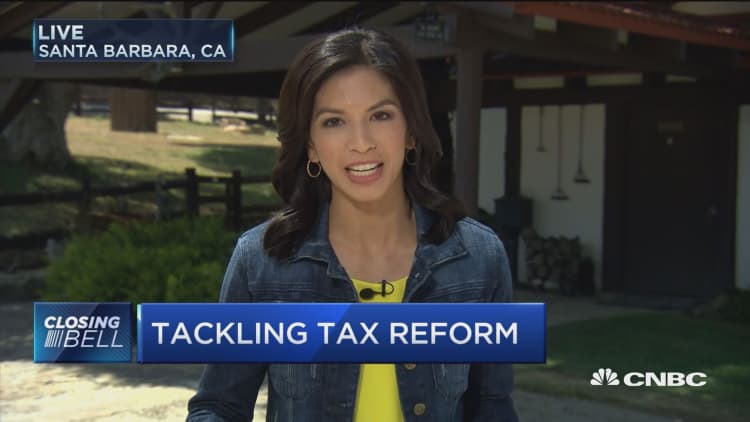Thirty-one years ago today, Congress agreed on a tax-reform package. A bipartisan group of Republicans and Democrats lowered individual and corporate tax rates, closed loopholes and shifted some of the burden to corporations.
Thirty-one years later, no one has repeated that effort.
President Donald Trump has pledged to change that. Trump has promised to lower corporate and individual tax rates. He has not revealed how he plans to offset those cuts.
Congressional Republicans have said they will work with Trump. House Ways and Means committee chairman Kevin Brady and other committee members are at the Reagan Ranch on Wednesday to show their commitment to the cause.

Not everyone is convinced the results will match the rhetoric.
"Tax reform would be great, but it's hard to do," said Howard Gleckman, senior fellow at the Urban-Brookings Tax Policy Center at the Urban Institute. "Certainly, anybody who thinks they can do broad-based tax reform in a few months is smoking an illegal substance."
Here's what happened 31 years ago.
Reagan signs bipartisan tax reform into law
Reagan spearheaded a tax cut in 1981. Three years later, he announced in his State of the Union that he had directed his treasury secretary to develop a plan for a comprehensive tax reform.
Reagan made reform a central component of his re-election campaign that year. He won 49 states. Democrats didn't really have a choice but to work with Reagan, said Steven Billet, director of the legislative affairs program at the George Washington University graduate school of political management.
It was easier to find common ground because most lawmakers were moderates, Billet said. Dan Rostenkowski, a Democrat, sponsored the bill.
"Some of the most liberal names in the Senate voted for it, like Ted Kennedy," said Douglas Holtz-Eakin, president of the American Action Forum. "You have to ask yourself, would that happen in today's environment? No, because they don't fear Donald Trump like they did Ronald Reagan."
Even with bipartisan support, negotiations nearly collapsed multiple times in 1986. But Reagan was there to rally support in critical moments, Gleckman said.
Reagan signed the bipartisan legislation into law more than 10 months after it was introduced. The plan lowered individual and corporate tax rates. It closed loopholes and shifted some of the burden to corporations to offset the lost revenue, neither of which appears to be likely now.
Trump promises tax reform in polarized environment
Trump has said he wants to slash the corporate tax rate to 15 percent from 35 percent and simplify the tax code.
To truly reform taxes rather than to simply cut them, lawmakers must offset lost revenue with additional revenue from another source. There are less obvious loopholes this time, making it a politically riskier tactic, Gleckman said.
Experts say tapping business is almost certainly off the table.
"They're not going to screw the corporate community this time," said Chris Edwards, director of tax policy studies at the Cato Institute. "Businesses are unified, and they're not going to be the cash cow that gets milked to cut taxes."
Trump is pushing tax reform in a polarized, partisan environment. Republicans could theoretically pass tax reform without Democrats, because they control the White House and Congress. However, the collapse of their health-care plan last month revealed the party is splintered and may not be able to unite behind a reform plan.
Trump has already rejected House Speaker Paul Ryan's border-adjustment tax on imported goods. Ryan abandoned the plan last month.
Trump will enter tax-reform negotiations after a contentious summer. He has publicly attacked Senate Majority Leader Mitch McConnell. His support among lawmakers appears to be eroding amid his comments about white nationalists.
"You gotta wonder whether Donald Trump at 36 percent approval ... would be able to pull members of his party through the keyhole here (like Reagan did) and get them to vote the right way in this whole process," Billet said. "It's not clear we have that kind of a dynamic in place."


